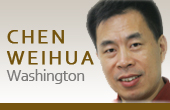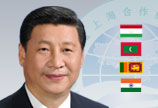A family business on US-China relations
By Chen Weihua in Washington (China Daily USA) Updated: 2014-09-26 14:53China policy work
After finishing her PhD in 2010, Hart was recruited by Peter Cowhey, who served on her dissertation committee, to the Aspen Institute in Washington in 2010, working on a new set of global trade rules for information technology.
Hart left Aspen a year later to join the CAP, where she focuses on US-China energy and climate and environment relationship. To Hart, it was somewhat a continuation of her previous work at Aspen because China has the same innovation policy for information technology and green technology.
She acknowledges that there was a lot of concern about the US competitiveness at that time, so CAP chose to bring in someone who knew China's innovation policy.
She sees climate and energy to be the biggest opportunities for the US and China to have deep and broad cooperation.
With the UN climate summit in New York this week, Hart hopes US President Barack Obama and Chinese President Xi Jinping will make another announcement on energy and climate when they meet in Beijing in November. The two had made related announcements in their previous meetings.
Regional gap
With pollution in China getting worse, Hart has seen the growing public pressure for action there. She says the central leadership has responded by rolling out a new air pollution program for the eastern seaboard. "I studied the policy program in great detail. They are very ambitious," she says. "What they have done so far is impressive. As foreign observers, we have to acknowledge the fact. A lot has been done domestically in China."
As a China scholar, Hart understands well why China is adopting different policies for different regions where economic structures are starkly different. "You cannot apply the same policy in Guangzhou as you want for central China. That's exactly like in the US, California and Texas have very different environmental policy," she says.
Though the regional approach may work best for big nations, Hart expresses her concern over the migration of coal plants and dirty industries from eastern China to western China.
She says that if the Chinese government can follow the amazing program in the east to come up with an amazing program for western China. "Then we have to acknowledge China is doing a great job."
She points out that a major obstacle for American companies to apply their cutting-edge technologies to China has been the weak protection of intellectual property rights.
"I have met US companies which have really great clean energy technologies, they really would love to have the China market as their first market for deployment because China is a big market and it's the best place to go," she says. "But they are so afraid of the IPR situation there they cannot do it."
Hart describes it as a very sad decision for those US companies, implying that it's sad for China too.
Broader study
With her new title as director of China policy at CAP, Hart has moved from the energy team to the national security team at CAP. She still pays the most attention on energy and climate change, but she has to broaden her study to even include the latest fight against Islamic State.
And she has certainly broadened her view at home where her husband, Yi Edward Yang, now teaches Chinese politics at the James Madison University in Virginia. The two first met at Texas A&M when Yang introduced Hart to the language program at CFAU where he graduated as an undergraduate.
Hart describes her husband's work on US-China relations as more academic and in a long-term way, such as analyzing US leaders and how their personal differences impacted their approach to China.
"So we have a family business on US-China relations," says Hart, a mother of a 9-month-old boy.
chenweihua@chinadailyusa.com










